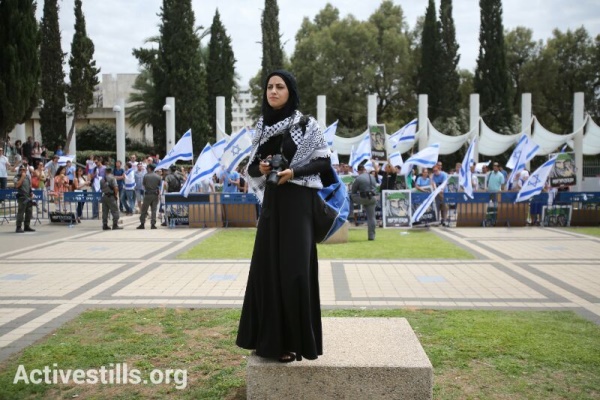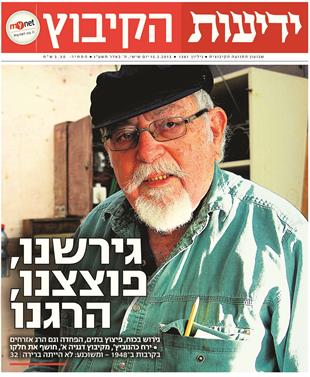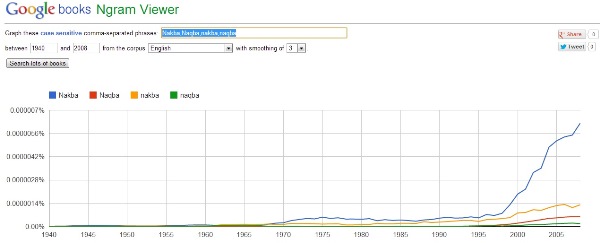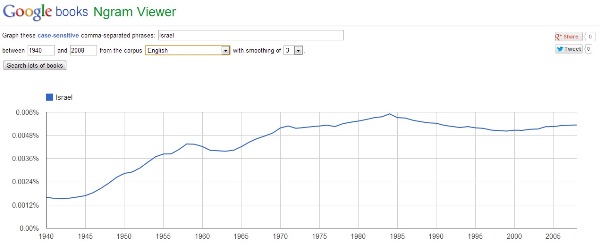The Israeli Right has been waging a war on history in recent years, using extreme measures to remove evidence of the Nakba from the national discourse. It failed.

Yedioth Hakibbutz is the weekly magazine of the United Kibbutz Movement. It is delivered every week to hundreds of Kibbutzim as part of the weekend edition of Yedioth Ahronoth, the best selling paper in Israel. Even at a time of diminishing political influence – there is not a single representative of the United Kibbutz Movement in the current Knesset – the Kibbutzim remain both a symbol and a stronghold of conservative Zionism, and the mainstream tone of Yedioth suits them well.
Three months ago, there was an unusual story on the cover of Yedioth Hakibbutz. The front page read: “We expelled, blew up and killed.” Inside the magazine was a three-page interview with Kibbutz Degania member Yerachmiel Kahanovich, a former fighter in the Palmach (the Jewish underground that preceded the IDF), in which Kahanovic confessed to his part in the expulsion and murder of Palestinians during the war of 1948.
Several months earlier, Kahanovich was interviewed as part of a project by Zochrot (“remembering”), a non-profit that deals with the Nakba from an Israeli perspective (an English translation of his testimony can be found here), and his testimony drew the attention of Yedioth reporters. Zochrot exists mostly in the margins of the Israeli discourse. Getting such a follow-up in the Kibbutz magazine was unique but not unheard of: in October 2012 the same paper ran a story on a Nakba tour book published by Zochrot.
Kahanovich’s testimony touched on one of the most awful events of 1948 – the intentional murder of Palestinian civilians who sought refuge from the fighting inside the Dahamsh Mosque in Lod. He also confessed that he had been ordered to shoot each Palestinian who tried to escape the procession of refugees marching out of the region. At time he sounded regretful – but he also felt that, “we had no choice.”
Q: Did you let the [Palestinians] residents get away?
YK: At first, yes. The intention was to expel them, these were the orders of the bosses, Yigal Alon and Yitzhak Sadeh. Sometimes we had to shot one or two, and then the rest got the message and left on their own. You need to understand: if you didn’t destroy the Arab’s home, he will always want to come back. When there is no home, no village, there is nowhere to return.
Q: Do you remember the battle for Lod and Ramleh?
YK: I don’t like to remember this so much… we shot shells into a mosque where many people were hiding. There was no choice.
Q: We shot?
YK: I shot with the PIAT [anti-tank weapon]. It has an enormous shock wave.
Q: And what were the results?
YK: Not pretty. They were all scattered on the walls.
Q: How many?
YK: I don’t know. Many. I didn’t count. I opened the door, saw what I saw, and closed [it].
Q: What did you feel?
YK: What can you feel after a thing like that? But if we didn’t do it, we might have been fighting to this very day. Then I stood with the Browning [machine gun] over the creek through which the remaining residents escaped. Anyone who strayed off track, got a shot.
Q: From you as well?
YK: From me too. I felt really bad but I was a good marksman, and there were times when they only asked me to fire a single bullet. At the village next to Ramleh, two shots were enough. In 45 minutes the village was empty. They got the message.
The Lod-Ramleh region was one of places where a massive, intentional expulsion of the Palestinian population took place. Controversies surround the departure of Palestinians from other areas; whether they were forced to leave or whether they escaped on their own. It’s not that important. The Israeli decision not to allow refugees to return to their homes – sometimes as early as two weeks after they fled or were forced to leave – is what made them refugees. Later came the confiscation of the entirety of “unclaimed” Palestinian property, which leaves no doubt about what happened in 1948. Intentional or not, this was ethnic cleansing.
***

Another Kibbutz story: a few years ago, some “internal refugees” (Palestinians who were displaced during the war but ended up within Israeli borders; they weren’t allowed to go back to their homes, but they did become Israeli citizens) planned a weekend trip to the hill where their village once stood. The news somehow reached members of a nearby Kibbutz – one of the pillars of the Kibbutzim movement and a Meretz stronghold – who were immediately alarmed. The Kibbutz email list came to life, with members suggesting that they form a counter-delegation and capture the hill before the Palestinians arrive. Others demonstrated a more hospitable approach. I don’t know how the story ended. I heard it from one of the Kibbutz’s members, a guy my age who has since left the country.
The tiniest symbolic action or gesture relating to the Nakba can unleash disproportionate panic among Jews, since the Nakba is not just the ghost of the Zionist project – it’s a very real and political problem. Both Israelis and Palestinians understand this. An Israeli-Palestinian leader once told me that he would not support building Nakba museums. “You put monuments when the story is over,” he said. “We are not there.”
In recent years, a trend of Nakba-denial has emerged in Jewish-Israeli political circles, a sort of conservative counter attack to the post-Zionism of the 1990s. Im Tirzu, a conservative group whose claim to fame was a campaign against the New Israel Fund, which included anti-semitic images, a couple of years ago published a propaganda booklet titled “Nakba-Bullshit” (it rhymes in Hebrew) which repeats many of the Israeli talking points on the refugee issue: from “there is no such thing as a Palestinian people” to “they fled of their own will” to “Jews from Arab countries also became refugees.” Activists from Im Tirzu urged students to avoid classes that mention the Nakba, distributed the booklet at university gates and staged counter-protests against memorial ceremonies on Nakba Day.
At the same time, the Israeli government initiated the Nakba law, authorizing the finance minister to withdraw funds from organizations commemorating the Nakba. One in every five Israelis is a Palestinian, and the law basically means that their public institutions are not allowed to deal with their own history. A petition against the law was rejected by the Supreme Court, demonstrating how threatened Israelis feel – that even the institution which is considered, and certainly considers itself the guardian of civil liberties, was ready to put such a limit on free speech. Since 2009 Palestinian schools have not been allowed to discuss or even use the term Nakba as part of their curriculum.
***
All these acts had a strange effect: while dealing with the ethnic cleansing of 1948 is still considered a “confrontational” and even “subversive” act, the term Nakba itself has become part of the mainstream discourse. The Arabic word “Nakba” (“disaster”) has been used to describe the Palestinian catastrophe as early as 1948, but I never heard the word until the nineties. Now I seem to hear it every other day.
Naturally, it’s not just in Israel. Google has a cute tool which allows you to see the number of times a term is used in the books in its databases. I searched the four common ways the word Nakba is spelled, “Nakba,” “Naqba,” “naqba” and “nakba” (the tool is case sensitive) and the same pattern emerged each time: a tiny surge in the mid-seventies and a skyrocketing rise at the end of the nineties.
Compare this, for example , to the word “Israel,” which is mentioned more frequently but its peak seems to have been in the eighties (the correlation of all those graphs with historical events is an interesting story in its own).
The Microsoft Word 2010 spellcheck software I use has yet to recognize the Nakba.
***
Last year, cops besieged activists who tried to distribute leaflets about the Nakba on Independence Day. This year’s events seem less tense. As I write this text, an outraged report on Israeli public radio opens the evening news broadcast with:
It happened today: at the entrance to Tel Aviv University some people marked the Nakba day and nobody did anything about it.
In fact, there was a small Im Tirzu vigil against the Nakba Day ceremony at Tel Aviv University, but except for some insults shouted into the air, the ceremony went on without interruption. Here is a video of the event:
The editor of Yedioth Hakibbutz told me that the interview with Yerachmiel Kahanovich went viral on Facebook but that at the same time, it hardly generated any hostile responses from kibbutz members. She sounded slightly disappointed.
A strange, bitter recognition of the Nakba seems to have settled in to the mainstream, incomplete yet undeniable. Israelis are beginning to acknowledge the past, although we are far from addressing its present consequences or its possible political implementation. However, one thing is clear: the war against history has failed. The Nakba will not be forgotten – not by Palestinians, nor by us.
Related:
Why Jews need to talk about the Nakba: A personal journey
Pretending away the Nakba only perpetuates the conflict
PHOTOS: Palestinians commemorate Nakba Day with rallies and protests
Report: Forced displacement on both sides of the Green Line
Remembering the Nakba, understanding this is a shared land
The Palestinian Nakba: Are Israelis starting to get it?




